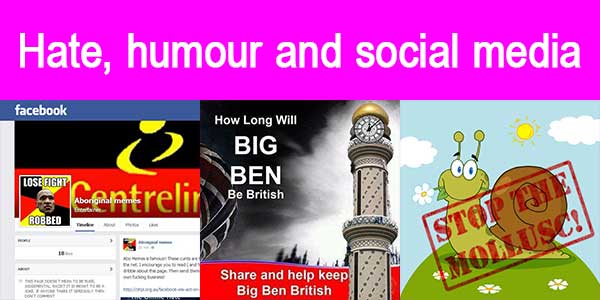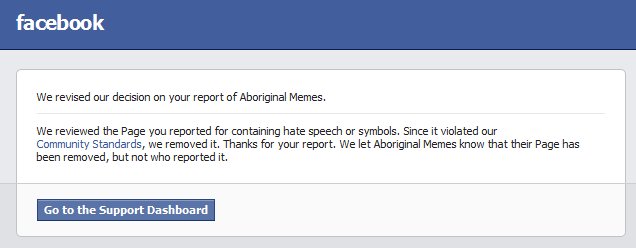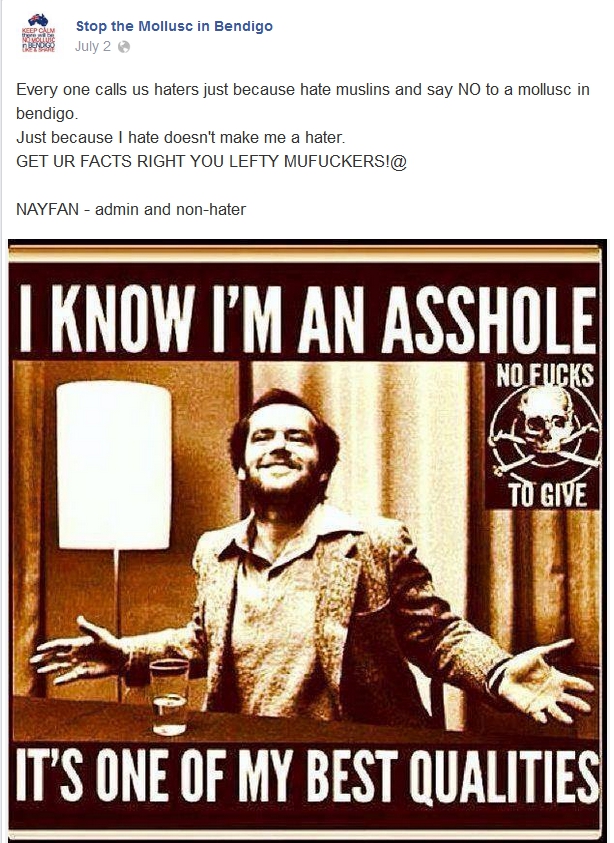Humour can be a powerful tool. It can break down barriers and allow the inappropriate or impolite to be said. Through humour deep fear can be broached and established power structures challenged. Humour, however, can also be used to enforce existing power structures, to humiliate, and to exclude.
In social media the power of humour has risen to a new level with Facebook claiming an assertion of humorous intent trumps the community standards which are designed to provide a safe environment. Racists are taking full advantage of this, using humour as a shield while they spread their message of hate. Also problematic is the general attitude of those who value their amusement above other people’s human rights. Humour in social media is, however, not all negative or benign. Some have taken to humour as a way of pushing back against the racists by ridiculing their message.
The Problem of Humour as a Shield for Hate
Following communications from OHPI in February 2014, Facebook blocked access in Australia to the page “FunnyAboMemes” (ID# 534831416587129) which was targeting Aboriginal and Torres Strait Islander people with hate speech. They refused, however, to close the page entirely as it claimed to be there for humour and instead left the hate visible for those outside Australia.
An example of one of the pages “humorous” posts:
At the time OHPI said:
Labeling something as humour does not give it an exemption from being racist. It does not make it suddenly “ok”… Not only is the page promoting racial discrimination, which is unlawful in Australia, the content also breaches Facebook’s Community Standards… [we] ask they go the next step and permanently close the page.
Five months later the hate page remained online. While overseas, OHPI’s CEO reported the page again, and again the report was rejected. An article in The Age last Thursday on the short comings of the current self regulation system in social media, and OHPI’s efforts to add more transparency to the process, made specific mention of the page and last night we were please to see Facebook revise its assessment and finally close this hate page for good.
It’s a small but important victory. The wider problem of Facebook permitting claims of humour to act as a shield to protect hate speech remains. This policy is wrong, greatly abused by overt racists, and it needs to change.
The Use of Humour as a Sword Against Hate
OHPI recently reported on the use of social media to import hate to regional Victoria. The briefing focused on the growing Facebook page against the proposed Bendigo Mosque. OHPI revealed how only 3% of the pages support actually came from Bendigo, and much of it came from interstate or overseas. These findings were reported in the media along with additional revelations about the external nature of the bigotry.
One Bendigo local decided to take a stand against the racism. His satirical page, “Stop the Mollusc in Bendigo”, rewords content from the “Stop the Mosque in Bendigo” page and redirects the fear and anger from focusing on the Mosque to focusing on Molluscs (the scientific classification for a group of invertebrate animals that includes snails and squids amongst others). The result, often put up side by side with the originals, highlights the irrational fear and hatred that the original page promoting.
Where a post from the anti-Mosque page speaking about “packs of middle eastern youth” roaming the streets (a post which we highlighted in our previously briefing after it led to a direct call for violence against children), the anti-Mollusc page speaks about “packs of snails”.
| The original | The satire |
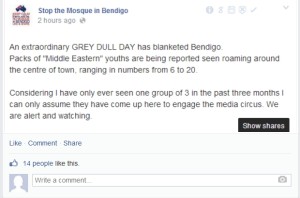 |
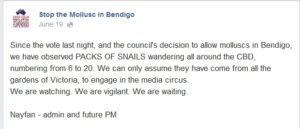 |
Where the anti-Mosque page argue Muslims are not a race, so being anti-Muslim isn’t being racist (an argument that is about as useful as someone arguing they are homophobic not racist, as it doesn’t make them any less bigoted) the anti-mollusc page makes the absurdity more direct, arguing hating doesn’t make one a hater.
Discussing his motivation, the anti-Mollusc page’s creator told OHPI that he “wanted to make a parody of the idiots [running the anti-Mosque page], to take their reality and turn it into humour as an exposé of just how hate-filled they are.” On learning that very few of the anti-Mosque page’s supporters were from Bendigo he said, “It makes me angry (that so many people who don’t even live here are giving us such a bad name in the media), sad (that so many people are so full of hate and fear to begin with), and happy (that there are so few bigots in Bendigo).” He explained that he had been active in anti-hate work for some time and the same faces kept cropping up time and time again, “it is just a core group of bigots that drive these things, although they do pick up new faces”.
The approach of Stop the Mollusc is similar to that of Britain Furst, a page mocking the far right England First political party. The administrator of Stop the Molluscs praised the Britain Furst page saying, “Satire and irony are very strong theories of humour that can take a dangerous idea and make it more idiotic than it at first appears to be.” Britain Furst certainly does this, and generates significant laughs in the process while also directly tackling many of the popular hate arguments that emerge from the far right in the UK. The page also posts some more serious content exposing the hypocrisy of the far right. As both the hate and a modus operandi of the hate groups spread internationally, these messages of satirical humour are significant not only for the UK but for Australia as well.
 |
 |
YouTube users are also getting in on the action. This video against Australian racists shows another approach to humour outside of satire:
Summary
While humour should not be a shield for racists, the use of humour as a form of counter speech against racism is particularly effective. While not all of us can create such humour, we can play a part in sharing it and spreading the message against racism. As the national campaign against racism says, “it stops with me”.

